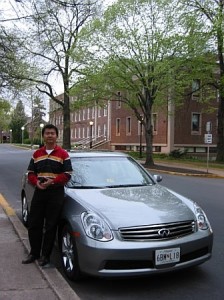By Dan Edelen
No machine runs without energy; just ask electrical engineering graduate Michael Choo ’93. From his office in the heart of Singapore, he empowers the high-revving economies of Asia—as a banker.

Michael Choo '93 during a visit to Lafayette.
Choo’s transition from engineer to financier occurred immediately after earning his master’s degree in business administration from Tulane, when J.P. Morgan in New York City made him an offer.
“I never did get to work as engineer,” Choo says, “but finance and engineering have remarkably similar principles. Both energy and money are precious and limited resources. Engineers strive to control the flow of energy and make it do useful work for society. Financiers strive to control the flow of money and send it to where it makes the best return on investment.”
For Choo, his life’s ROI has come through a series of fortuitous events and one staggering question asked of him at Lafayette.
Despite growing up in a more restrictive Malaysian culture, Choo had the foresight to consider all his options, which led him to choose the United States for a college education. “All I knew about the U.S. was from movies,” Choo says. “You watch movies and TV, and you say, ‘Wow, that seems like a great place. People have a fun time and do whatever they want to do.’”
As Choo was evaluating undergraduate institutions, he met Stephen M. Silver, a former associate director of admissions at Lafayette, during a visit to his country. Their conversation sealed the deal for Choo.
Then came the pivotal question that forever changed Choo’s understanding of the world. It was posed by Carolynn Van Dyke, Francis A. March Professor of English, during an English 102 class.
“I was discussing a book we had read, and I said that the female character has an understandably weak character, and we should not expect her to be so bold. The immediate response from Professor Van Dyke was ‘why not?’ Choo recalls. “I was surprised at this question and tried in vain to respond, only to realize all my answers were weak.”
The cognitive dissonance of the question nagged him long after class ended and challenged some fundamental beliefs he had adopted from the male-dominated culture of his homeland. “I examined my personal views, which I thought were universal truths, and began to realize that we shouldn’t take opinions to be automatically right,” he says. “Instead, we should consider carefully the ‘why not?’”
In his role as managing director and head of special accounts in Asia for UniCredit Bank AG, Choo helps distressed companies control their debt and limit losses. He is known for bringing tough questions to the table. In an Asian culture where the catch-all answer to problems is to work harder, his forthrightness allows him to overcome traditional responses and design better outcomes for his clients and UniCredit.
Challenging longstanding assumptions serves Choo well but has earned him a “maverick” title. “People react with a mixture of uneasiness and admiration. I’m accused of being too American,” he says. “One of the attributes of Americans is ‘straight shooting.’ People here get shocked because I’m so blunt. I always ask, ‘why not?’”
Choo says questioning the status quo works for those who need to explore new directions, be they company leaders or students looking to expand the breadth of their experiences.
During his sophomore year at Lafayette, Choo expanded his horizons by studying abroad in Brussels. “Understanding and appreciating the different cultural values has helped me to see situations from different perspectives and come up with business proposals acceptable to a wider audience,” he says.
Choo, who serves as a Lafayette International Alumni Admissions Representative, recommends that today’s students consider a similar experience. “It’s much better to commit a cultural faux pas with other 19-year-olds, who will just think you’re weird, than with the CEO you’ve never met and with millions at stake. Holiday travel doesn’t count. You have to live and breathe the same air and deal with the same issues together to really appreciate the cultural intricacies.”
Navigating intricacies of culture and business to provide direction to a struggling company places an enormous burden on Choo—one measured in dollars trailing many zeroes.
“Giving someone a billion dollars is significant. You hope that someone knows how to handle it,” Choo says. Where he differs is in his motivations. “Too many bankers are focused on the deal. It is the rare banker who steps back and asks if this is the right thing to do.”
And plenty can change from asking the perfect question.
